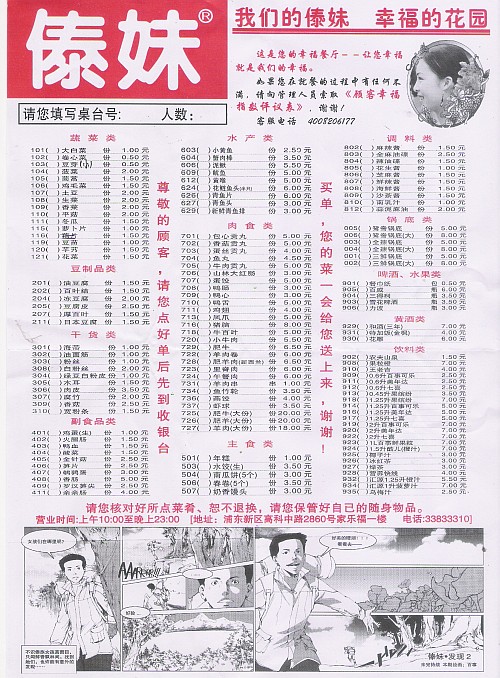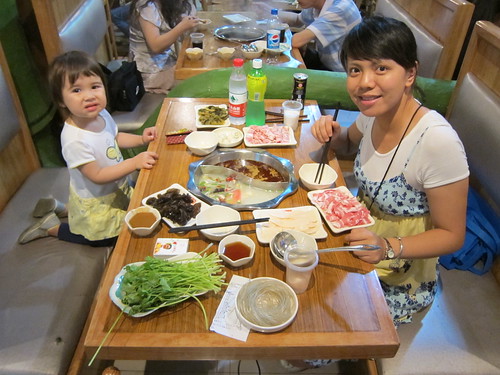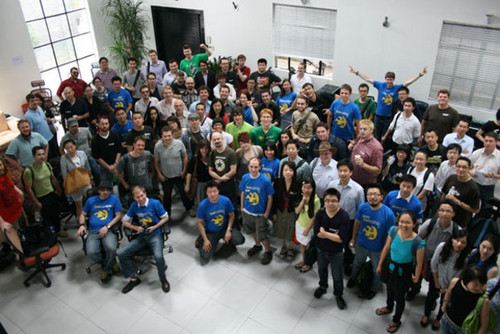Micah Sittig
你是互联网,我是防火墙
Wednesday, June 23, 2010
Tuesday, June 15, 2010
I haven't written an old-school China post in a while, which supports the thesis of this post, but it still makes me feel funny about writing it.
Something I noticed at the recent Shanghai barCamp and that came back to me while reading the Laowai Wenshen blog† is the feeling that these days I meet more and more foreigners who have been in China for 5, 6 or more years. These folks are usually somewhat conversant in Chinese and don't think much of it, or still don't speak much but are cognizant of this as something to regret. They've moved beyond the "China contrasts" stage, the "China is so different" stage; they're done "experiencing China" and instead are focused on getting on with their lives, building careers and families, investing in friends and lifestyles, and living constructively making things that are worthwhile.
I'm not saying that people like this didn't exist before. They did, but they were always the exception, a novelty.
This all makes me feel really comfortable and satisfied. Maybe it's because I grew up abroad that I feel like I had a leg up on this, and it's been something I've been looking forward to for a while now. I don't have to fake the "China is so strange" conversation with people as often; I don't have to explain Chinese words I drop into conversations; and I don't feel like I'm imposing on people when I recommend things to them that require interacting with locals, moving around the city/country, or letting themselves down off the magic carpet ride of "China" to deal with the mundane business of Real Life. Let's talk about hospitals where you had your baby! Let's talk about local politics or something you read in the newspaper! Let's complain about the cost of living and how we'll never own a house! Let's talk about your latest project that isn't some expat-focused website guide to Shanghai. This is the kind of stuff I find satisfying these days, and it's getting easier to find.
† And also at Julen's BBQ party, and writing for Shanghaiist, and...
Monday, June 07, 2010
Flower girl
Maryann at the Expo:

Jodi was given two tickets and a day off to visit the Expo by her preschool. She took her mom, and Charlotte and Maryann for a few hours in the afternoon. They had a good time, but it was hot and tiring. Some pavilions let them in the "fast lane" line because they were pushing strollers (US, Egypt), but others were more strict and would only give passes to children under 1 (Australia). Jodi's mom saw enough, but Jodi wants to go back some evening.
Subway Volunteer II

I went to the Metrofans' Saturday volunteer activity again this weekend. I got put on the ticket machines in Line 8, then switched back to the same turnstiles as last week. Jodi and Charlotte dropped by on their way to class.

Mostly it was the same deal as last week: answering questions (exit 19 is Nanjing Rd, exit 3 is Fuzhou Rd), helping people insert tickets or sending them to the service center, and steering people away from turnstiles that stopped accepting single-trip tickets due to mechanical problems. Mostly this happens because the turnstiles are getting old, but also 3 times I caught people trying to stick stuff other than subway tickets into the turnstiles:
- Expo one-day ticket
- Hotel room key card
- Travel agent business card
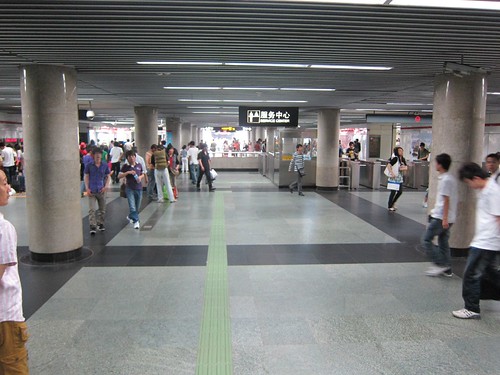
After the two hours were up we took a group photo:

Then some of the forum members went out to Yunan Rd for dinner.

The restaurant was Sichuanese, but these kids (yeah, I'm probably the oldest by 4 or 5 years) are all Shanghainese so of course we also had dishes like 娃娃菜 and 红烧肉.

We rounded off the night with a couple rounds of the 三国杀 card game.

Good times.
Tuesday, June 01, 2010
Two texts that caught my eye
I'd like to share two interesting pieces of text that I read today. The first comes from the Metrofans BBS subforum for the Zhangjiang Tram. A few days ago there was an incident where a car crashed into the tram, which lead people to discuss the safety of the new tram line (incidentally, the car was totaled but the tram came off with only a few scratches). Some posters suggested that tram-only lanes should be demarcated on wider streets and that narrow roads, including the horrible mess at Guanglan Rd near our house, are responsible for the accident and for the elimination of Shanghai's historical trolley buses. This poster thinks otherwise:
你知道什么?当年浦西的有轨电车是很多的,有十几条线路,而且,有轨电车都在一些很窄的路上的开的,如浙江路、湖北路,重庆南路,四川路等,事故很少,大家都避开轨道就没事。被拆的原因是极左思想,认为这是英商和法商电车公司留下的东西,有租界的烙印,所以就拆了,当时是文革时期,自然没人敢反对,其实,许多上海人都觉得很可惜!
You know what? Back in the day Puxi had lots of tram lines, more than ten, and all of them ran on very narrow streets, like Zhejiang Road, Hubei Road, Chongqing S Road, Sichuan Road, etc. Even so, there were very few accidents; people just knew to stay out of the trolley's way. The trolley lines were dismantled due to far-Leftist thinking, that they were shadows of the Concession era and the British and French merchants that used to run them. That was back in the GPRC, so of course nobody dared speak out against it. Actually, a lot of Shanghainese feel it was a shame to lose the old trolley lines!
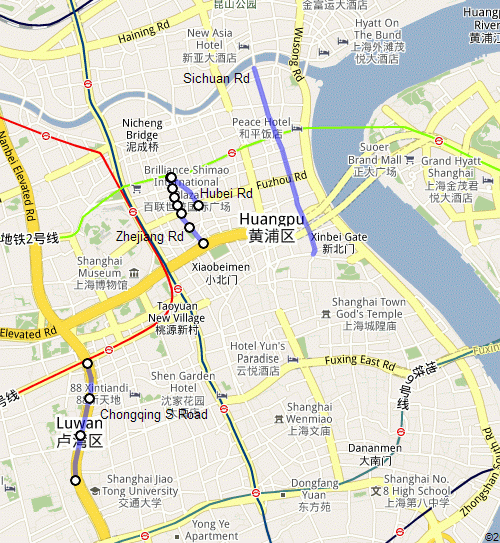
That's sorta cool. Makes me want to go look for evidence of the old trolley lines.
The other is from a series of posts by Jiang Xueqin on The Diplomat's China weblog about Chinese education and the former principal of Shenzhen Middle School, Wang Zheng.
By far, Principal Wang Zheng's biggest impact was on student life. He divided the students into eight different houses, and each house had its own student management system. With the house system, imposing and intimidating Shenzhen Middle School (with a campus the size of three city blocks and 2,400 students spread over three grades) became friendly and intimate. Helping the lowerclassmen adapt to this new education system were the Prefects, upperclassmen mentors who liked to organize surprise birthday parties for the lowerclassmen. And organizing activities and competitions among the houses was student government.
Student life was vibrant and diverse, but its most striking characteristic was that it was entirely student-built and managed. Student cadres were not just the glorified hall monitors found at other Chinese schools—they were democratically elected representatives who served the interests of their classmates. They solicited corporate sponsors for basketball and soccer tournaments (one student was so charming that he received $30,000 from China Mobile). They organized masquerade balls and "American Idol" competitions. On December 31st of each year hundreds of volunteers stayed up all night to organize the school's annual winter carnival; on New Year's Day, over 100,000 Shenzhen residents would come to buy goods and play games, listen to concerts and watch performances.
This reminds me a lot of the house system at Caltech but better, and I think that this kind of grade-to-grade interaction would lend a lot to a high school. Read on for a fuller description of Wang Zheng's reforms, and the reaction from parents to changes at one of Shenzhen's top middle (high) schools.
Also, for some more background reading on the subject, see these links:
- Shenzhen Middle School website
- "Green Room" is the monthly English magazine of the Special Curriculum at Shenzhen High School.
- Jiang Xueqin's professional weblog, detailing his relationship with principal Wang Zheng.
- Google Cache of a classified ad for AP teachers to teach at Shenzhen Middle School. Contact is Ohio grad Patrick MacAloon.
- Columbus Culture, Patrick MacAloon's educational consulting company.
- Baidu Tieba post hinting at dissatisfaction with Jiang Xueqin's plans for a Special Curriculum
- Wang Zheng and Jiang Xueqin currently back at the Middle School Attached To Peking University.
About Me

- Name: Micah Sittig
- Location: Zhangjiang High-Tech Park, Shanghai, China
Archives
- 11/01/2002 - 12/01/2002
- 12/01/2002 - 01/01/2003
- 01/01/2003 - 02/01/2003
- 02/01/2003 - 03/01/2003
- 03/01/2003 - 04/01/2003
- 04/01/2003 - 05/01/2003
- 05/01/2003 - 06/01/2003
- 06/01/2003 - 07/01/2003
- 07/01/2003 - 08/01/2003
- 08/01/2003 - 09/01/2003
- 09/01/2003 - 10/01/2003
- 10/01/2003 - 11/01/2003
- 11/01/2003 - 12/01/2003
- 12/01/2003 - 01/01/2004
- 01/01/2004 - 02/01/2004
- 02/01/2004 - 03/01/2004
- 03/01/2004 - 04/01/2004
- 04/01/2004 - 05/01/2004
- 05/01/2004 - 06/01/2004
- 06/01/2004 - 07/01/2004
- 07/01/2004 - 08/01/2004
- 08/01/2004 - 09/01/2004
- 09/01/2004 - 10/01/2004
- 10/01/2004 - 11/01/2004
- 11/01/2004 - 12/01/2004
- 12/01/2004 - 01/01/2005
- 01/01/2005 - 02/01/2005
- 02/01/2005 - 03/01/2005
- 03/01/2005 - 04/01/2005
- 04/01/2005 - 05/01/2005
- 05/01/2005 - 06/01/2005
- 06/01/2005 - 07/01/2005
- 07/01/2005 - 08/01/2005
- 08/01/2005 - 09/01/2005
- 09/01/2005 - 10/01/2005
- 10/01/2005 - 11/01/2005
- 11/01/2005 - 12/01/2005
- 12/01/2005 - 01/01/2006
- 01/01/2006 - 02/01/2006
- 02/01/2006 - 03/01/2006
- 03/01/2006 - 04/01/2006
- 04/01/2006 - 05/01/2006
- 05/01/2006 - 06/01/2006
- 06/01/2006 - 07/01/2006
- 07/01/2006 - 08/01/2006
- 08/01/2006 - 09/01/2006
- 09/01/2006 - 10/01/2006
- 10/01/2006 - 11/01/2006
- 11/01/2006 - 12/01/2006
- 12/01/2006 - 01/01/2007
- 01/01/2007 - 02/01/2007
- 02/01/2007 - 03/01/2007
- 03/01/2007 - 04/01/2007
- 04/01/2007 - 05/01/2007
- 05/01/2007 - 06/01/2007
- 06/01/2007 - 07/01/2007
- 07/01/2007 - 08/01/2007
- 08/01/2007 - 09/01/2007
- 09/01/2007 - 10/01/2007
- 10/01/2007 - 11/01/2007
- 11/01/2007 - 12/01/2007
- 12/01/2007 - 01/01/2008
- 01/01/2008 - 02/01/2008
- 02/01/2008 - 03/01/2008
- 03/01/2008 - 04/01/2008
- 04/01/2008 - 05/01/2008
- 05/01/2008 - 06/01/2008
- 06/01/2008 - 07/01/2008
- 07/01/2008 - 08/01/2008
- 08/01/2008 - 09/01/2008
- 09/01/2008 - 10/01/2008
- 10/01/2008 - 11/01/2008
- 11/01/2008 - 12/01/2008
- 12/01/2008 - 01/01/2009
- 01/01/2009 - 02/01/2009
- 02/01/2009 - 03/01/2009
- 03/01/2009 - 04/01/2009
- 04/01/2009 - 05/01/2009
- 05/01/2009 - 06/01/2009
- 06/01/2009 - 07/01/2009
- 07/01/2009 - 08/01/2009
- 08/01/2009 - 09/01/2009
- 09/01/2009 - 10/01/2009
- 10/01/2009 - 11/01/2009
- 11/01/2009 - 12/01/2009
- 12/01/2009 - 01/01/2010
- 01/01/2010 - 02/01/2010
- 02/01/2010 - 03/01/2010
- 03/01/2010 - 04/01/2010
- 05/01/2010 - 06/01/2010
- 06/01/2010 - 07/01/2010
- 09/01/2010 - 10/01/2010
- Current Posts
